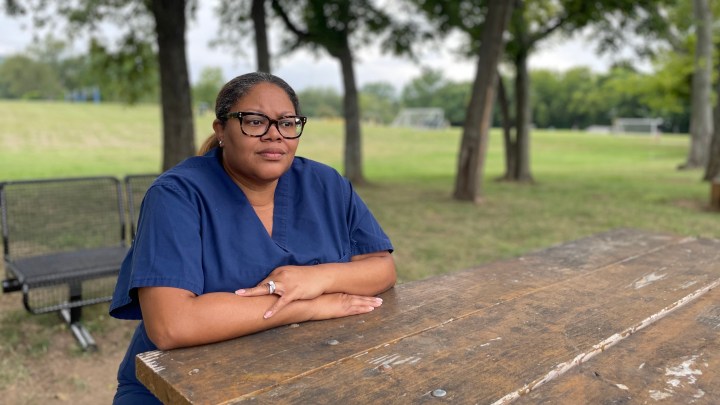
Obstetricians weigh their legal risks under Tennessee’s new abortion ban
Obstetricians weigh their legal risks under Tennessee’s new abortion ban

More than 30 years ago, when Dr. Carolyn Thompson chose to specialize in obstetrics and gynecology, she had little thought of Roe v. Wade being overturned.
Now that federal abortion protections have ended, the state where she’s spent her career has outlawed abortion.
“I had no idea that I would be setting myself up to be a criminal, and that’s pretty much the way it is now,” she told an audience this month as the state of Tennessee prepared for its all-out abortion ban to take effect Aug. 25.
Many OB-GYNs say they are more passionate about reproductive health than ever. They’re just worried, especially in states like Tennessee where abortion is going away. The law would punish those who perform abortions. And in Tennessee, the punishment would be a felony along with a major fine and likely the end of their medical career in the state.
But abortions happen all the time to care for a miscarriage or other nonviable pregnancies. That’s one reason the American College of Obstetricians and Gynecologists has made an unequivocal statement that abortion is “an essential component of comprehensive, evidence-based health care.” But Tennessee’s law has no real exceptions for doctors. If charged, it’s on doctors to prove that their actions were justified to save the life of a mother.
Thompson said she’s treading lightly and seeking legal counsel even though she’s often the one giving advice as a medical litigation consultant.
“Having guidance from attorneys who do have your best interest at heart is very important going forward,” Thompson said, adding that she sometimes has to seek consultations while with a patient. “I’ve already had circumstances where I have to leave the room and say, ‘Hey, I‘ve got to call my liability carrier because I need to find out what’s acceptable for me to tell you.’”
OB-GYNs are concerned about how far they can go in guiding patients how to get an abortion in another state, which is often the only option now.
In Chattanooga, Dr. Leilah Zahedi said having a criminal defense attorney on retainer cost her $10,000. She’s a high-risk obstetrician, so all of her patients have complications. Often, they have a desired pregnancy. But caring for a mother with health problems can be a delicate balance with the life of the fetus, which challenges doctors.
“They’re not making decisions that are evidence-based anymore,” she said. “They’re making decisions to protect themselves — which is the right thing to do in most cases. I can do no one any good if I don’t have a license or if I’m in jail, quite honestly. I am no good to anyone at that point.”
But Chicago attorney and anti-abortion activist Paul Linton said doctors acting in good faith have nothing to fear under Tennessee’s law, which he helped write along with similar abortion bans in Idaho and Texas, all going into effect this week.
“If there are unusual circumstances that justify an abortion, there’s no doubt in my mind that a prosecutor would not charge someone,” he said, adding that at least a “responsible prosecutor” wouldn’t charge a doctor attempting to follow the law.
But OB-GYNs say there’s not enough appreciation of the nuance they face every day. Take the patient Zahedi just treated, who was 15 weeks along and her water had broken, but the fetus still had a heartbeat. Infection risk for the mother increases by the day. But Zahedi said she would probably send that mother out of state now.
Many OB-GYNs are playing it safe, including Dr. Kimberly Looney. Up until a few weeks ago, Looney was performing abortions all the time as chief medical officer for Planned Parenthood of Tennessee and North Mississippi.
“I don’t see a lot of my colleagues falling on the sword,” she said. “I don’t think that’ll happen.”
Looney has left Planned Parenthood to enter private practice and said she may face extra scrutiny because of her resume.
“I’ve always felt like a target,” Looney said. “I believe in a woman’s right to choose, and me making the choice to be her advocate will always make me a target.”
But it’s the rest of the medical profession that’s about to get a dose of reality, Looney said. Because she’s the one who took difficult patient referrals in the past when a sticky situation came up. When abortions were still allowed on a limited basis, she would hear from a cancer doctor about a pregnant patient who needed to terminate in order to receive aggressive treatment, or about a rape victim, or a pregnant child. Now, with no exceptions, “for that pediatrician with a 12-year-old that’s pregnant — because it happens — that’s now your problem,” she said. “It’s an everybody problem.”
There’s a lot happening in the world. Through it all, Marketplace is here for you.
You rely on Marketplace to break down the world’s events and tell you how it affects you in a fact-based, approachable way. We rely on your financial support to keep making that possible.
Your donation today powers the independent journalism that you rely on. For just $5/month, you can help sustain Marketplace so we can keep reporting on the things that matter to you.











